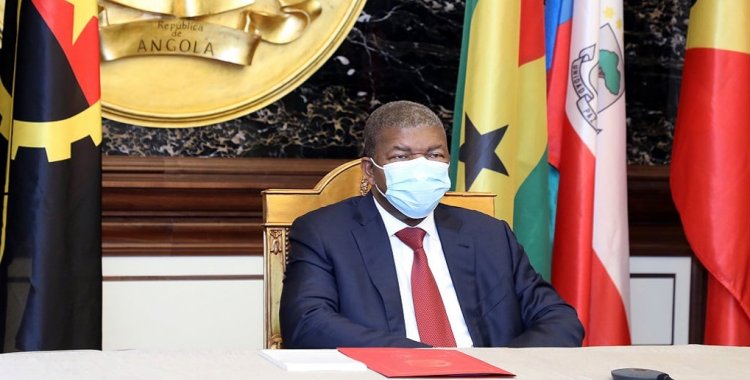João Lourenço was addressing the Presidents of Cape Verde, Jorge Fonseca, of Mozambique, Filipe Nyusi, of Guinea-Bissau, Umaru Sissoco Embaló, of Equatorial Guinea, Teodoro Obiang, and of Sao Tome and Principe, Jorge Bom Jesus, at the opening of the Conference of Heads of State and Government of the PALOP Forum held this Tuesday, virtually, in Luanda.
The President stressed that these countries have encountered various obstacles that slow their development and compromise their goals, citing examples such as the volatility of commodity prices, as well as, in recent times, the impact of covid-19.
"With the emergence of vaccines, we are currently seeing a light at the end of the tunnel in the journey we have taken to find solutions to help mitigate the effects of the covid-19 pandemic," the leader pointed out.
"It is necessary to make our international partners realize that the African continent needs a lot of understanding and solidarity to recompose ourselves from the damage and the losses that this global health crisis has caused in our countries," he considered.
In addition, "it is urgent" to correct the current reality of difficult access to vaccines by African countries "that do not have their own capacity of local production of vaccines, do not have large financial resources to acquire them and therefore run the serious risk of seeing their populations being vaccinated only after the more developed world has done so.
The head of state also expressed concern to his counterparts about the "instability and permanent conflict that prevail in the continent and aggravate the social and humanitarian dramas of the population."
"We cannot resign ourselves to this reality. In our capacity as a group of African countries linked by a common history and struggle, we are concerned about the situation of conflict ravaging the sister republic of Mozambique, some countries of the Great Lakes Region and the CEEAC [Economic Community of Central African States], and the Sahel Region of our continent," he stressed.
In his speech, João Lourenço emphasized that a period had elapsed since the leaders of the Portuguese-speaking African countries (PALOP) had not met to address issues of common interest and boost actions to deepen cooperation among themselves, considering it essential "to establish a joint understanding on ways to boost the functioning of the organization in the interests of all member states.
Lourenço highlighted the importance of a coordinated action in the fight for self-determination of the PALOP countries in the past, "crucial" to overcome colonial rule, stressing that the ideals of the "fathers of independence" in the sense of building a prosperous, united and developed Africa remain.
The head of state appealed to his counterparts that their respective countries seek "regularly to agree on positions" that safeguard their concerns and interests, in the major international forums and organizations in which they participate, to reap the best results.
"I believe that if we are able to leverage the use of the material and intellectual capabilities that each of our nations possess, we will be in a position to complement each other in the fields of education, health, defense, and security, among others. We encourage an intense movement between our countries, of businesspeople, academics, tourists, researchers and students, and of cultural and scientific agents," he stressed.
A "capital", he reinforced, that should serve as a basis to deepen the friendship ties, as well as the economic cooperation and commercial exchange.
For João Lourenço the consensual strategic positions should also be adopted in issues related to climate, in the sense that the decisions do not condition the right to development of these countries, which suffer "a strong incidence of the serious effects caused by climate change".
The PALOP Forum has existed legally since 2014 and is a mechanism for political-diplomatic concertation and cooperation between Portuguese-speaking African countries.
Equatorial Guinea, a former Spanish colony, joined the Community of Portuguese Language Countries (CPLP) in 2014, when it adopted Portuguese as one of the official languages, joining Angola, Brazil, Cape Verde, Guinea-Bissau, Mozambique, Portugal, Sao Tome and Principe and East Timor in this organization.







